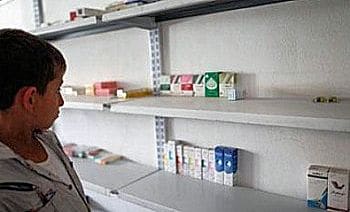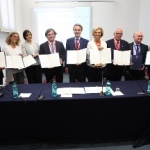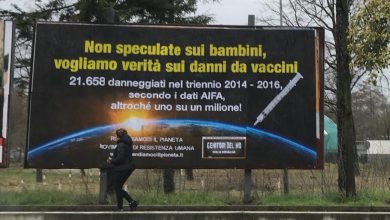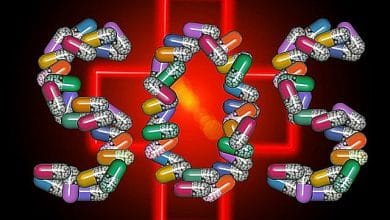
Signed a shared document - the result of collaboration between the Ministry of Health, Aifa and two Regions (Lazio and Lombardy) - joined by Farmindustria, Assogenerici, Federfarma, Adf, Assoram and Federfarma Servizi
Of Aboutpharma Online editorial staff – September 12, 2016 – Aboutpharma
 An alliance between institutions and sector associations against the phenomenon of "untraceable" medicines, ie the unavailability of some medicines on the national territory, often due to parallel exports. It is the one sanctioned by a document signed in recent days (and announced today) by Farm industry, Assogenerics, Fedefarma, Adf (Pharmaceutical Distributors Association), absorb And Fedefarma Services, fruit of the collaboration between Ministry of Health, Italian Medicines Agency (Aifa), Region Lazio and Region Lombardy.
An alliance between institutions and sector associations against the phenomenon of "untraceable" medicines, ie the unavailability of some medicines on the national territory, often due to parallel exports. It is the one sanctioned by a document signed in recent days (and announced today) by Farm industry, Assogenerics, Fedefarma, Adf (Pharmaceutical Distributors Association), absorb And Fedefarma Services, fruit of the collaboration between Ministry of Health, Italian Medicines Agency (Aifa), Region Lazio and Region Lombardy.
The text - AIFA explains in a note, after having hosted the signing of the document at its headquarters - reaffirms the fundamental regulatory principles that regulate the drug sector with particular regard to the aspects of distribution, both wholesale and retail, which they have “the ultimate goal of protecting public and individual health, guaranteeing the availability and accessibility of the drug”.
"The signing of this document testifies to the widespread and profuse commitment of all the institutions involved at various levels in the pharmaceutical supply chain - comments the president of AIFA, Mario Melazzini – which together have the common goal of always guaranteeing the quality, safety and access to the 'good' drug at all stages of its life cycle”.
The 2015 Working Table and the pilot project
 Already in 2015, in the face of numerous reports concerning the unavailability of some medicines, a working table was set up - in which Aifa, the ministry, Lombardy and Lazio participate, with the support of the Carabinieri Command of the Nas - and a pilot project was launched to identify shared methods for the intensification of supervisory activities on the concrete application of current regulations, through a series of controls on the territory. "The work of this table - underlines the general director of AIFA, Luke Pani – is of fundamental importance because it consolidates the role of the 'regulatory' in a historical context and moment in which the drug, which is becoming an ever smaller asset with an ever greater value, can become the object of interests that escape ethical principles. Fortunately, Italy can boast one of the most efficient surveillance systems in Europe, implemented by the police forces specialized in health protection".
Already in 2015, in the face of numerous reports concerning the unavailability of some medicines, a working table was set up - in which Aifa, the ministry, Lombardy and Lazio participate, with the support of the Carabinieri Command of the Nas - and a pilot project was launched to identify shared methods for the intensification of supervisory activities on the concrete application of current regulations, through a series of controls on the territory. "The work of this table - underlines the general director of AIFA, Luke Pani – is of fundamental importance because it consolidates the role of the 'regulatory' in a historical context and moment in which the drug, which is becoming an ever smaller asset with an ever greater value, can become the object of interests that escape ethical principles. Fortunately, Italy can boast one of the most efficient surveillance systems in Europe, implemented by the police forces specialized in health protection".
Already in the first few months, the work of the roundtable - continues the AIFA note - allowed the definition, with respect to the territorial scope of the Lazio Region, of a list of unavailable drugs and a list of operators (identified on the basis of data available in the traceability system) who allegedly carry out export activities in relation to the medicines included in the list. Then, the control activities carried out by the Nas among the operators verified the documentation relating to the drugs indicated in the list and subject to export, imposing administrative sanctions in the event of irregularities.
 Federfarma: "Important step against parallel exports"
Federfarma: "Important step against parallel exports"
The document represents "an important step forward to counter the temporary unavailability of medicines in the area caused by the phenomenon of parallel exports", according to the president of Federfarma, Annarosa Racca. “It is unacceptable – continues the president of the federation – that a patient cannot find a drug just because it is economically cheaper to sell it abroad. We will continue to closely monitor the situation and report missing medicines, just as we will continue to sensitize the Regions so that the control of the requirements required of operators who intend to export medicines takes place with rigid and standardized procedures throughout the national territory”.
Farmindustria: "Common action plan for easy access to medicines"
On behalf of drug companies, the president of Farmindustria, Massimo Scaccabarozzi, underlines the "great result" achieved with the signing of the document, i.e. "developing a common action plan to prevent the occurrence of phenomena of unavailability of drugs on the national territory". A commitment "also undertaken by companies in the sector who want to continue to guarantee citizens the possibility of finding - without difficulty - the medicine they need". Since the first application of the pilot project, "important goals" have been achieved, from now on it is a question of "continuing on this path, overcoming any ambiguity to meet the health needs of patients", concludes the number one of Farmindustria.
 The Association of Pharmaceutical Distributors (Adf): "Phenomenon that is already born in the pre-distribution phase"
The Association of Pharmaceutical Distributors (Adf): "Phenomenon that is already born in the pre-distribution phase"
On the distribution front, the president of the Association of Pharmaceutical Distributors (Adf), Mauro Giombini, emphasizes the need to face the problem at 360 degrees: "It is a multifactorial phenomenon that already arises in the pre-distribution phase, given that our surveys show strong differences for the various drugs involved in the phenomenon (up to 90%) between the quantities requested and those delivered by the industries to our associates. The shared document is appreciable because it corrects the tendency of the Regions to grant authorizations for wholesale distribution to applicants without the minimum structural requirements which we consider essential for carrying out full-line intermediate distribution to pharmacies. However - concludes Giombini - two other points remain open, in addition to the identification of minimum physical criteria of the warehouses: the sharing of the surveys carried out and of the data also held by other trade associations, completed by the comparison with the prescriptive framework of electronic prescriptions and the consequent definition of an adequate level of coverage in procurement".
Related news: AIFA. 511 Press Release Unavailability of medicines: administrations and sector associations sign a shared document to resolve the problem
Fedefarma. From supply chain and institutions iron pact against "fake" distributors





